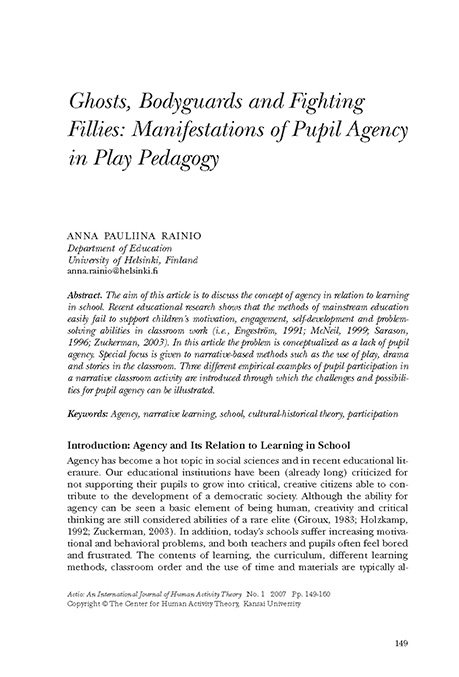
Abstract
Reference

Abstract
The aim of this article is to discuss the concept of agency in relation to learning in school. Recent educational research shows that the methods of mainstream education easily fail to support children’s motivation, engagement, self-development and problemsolving abilities in classroom work (i.e., Engeström, 1991; McNeil, 1999; Sarason, 1996; Zuckerman, 2003). In this article the problem is conceptualized as a lack of pupil agency. Special focus is given to narrative-based methods such as the use of play, drama and stories in the classroom. Three different empirical examples of pupil participation in a narrative classroom activity are introduced through which the challenges and possibilities for pupil agency can be illustrated.
References
Bruner, J. (1996). The culture of education. Cambridge, London: Harvard University Press.
El´konin, D. B. (2005). The psychology of play. Journal of Russian and East European Psychology, 43(1), 11-21.
Engeström, Y. (1991). Non scolae sed vitae discimus: Toward overcoming the encapsulation of school learning. Learning and Instruction, 1, 243-259.
Giroux, H. A. (1983). Theory and resistance in education. A pedagogy for the opposition. New York: Bergin & GarveyPublishers, Inc./p>
Gordon, T., Holland, J., & Lahelma, E. (2000). Making spaces: Citizenship and difference in schools. London: Macmillan.
Hakkarainen, P. (2004). Narrative learning in the fifth dimension. Outlines. Critical Social Studies, 2004(1), 1-20.
Hakkarainen, P. (2006). Learning and development in play. In J. Einarsdottir & J. T. Wagner (Eds.), Nordic childhoods and early education. Philosophy, research, policy and practice in Denmark, Finland, Iceland, Norway, and Sweden (pp. 183-222). Connecticut: Information Age Publishing.
Hofmann, R. (2006). Ownership and alienation in learning: a socio-cultural perspective on the construction and learner experiences of agency in school (Manuscript in preparation): Faculty of Education, University of Cambridge.
Hofmann, R., & Rainio, A. P. (2006). “It doesn’t matter what part you play, it just matters that you’re there” Analysing the formation of shared agency in pupil talk and activity in school. Paper presented at the Language in Action. Vygotsky and Leontievian Legacy Today, University of Jyväskylä, Finland.
Holland, D., Lachicotte Jr., W., Skinner, D., & Cain, C. (1988). Identity and Agency in Cultural Worlds: Harvard University Press.
Holzkamp, K. (1992). On doing psychology critically. Theory and Psychology, 2(2), 193-204.
Kudriavtsev, V. T., & Urazalieva, G. K. (2006). The subject of activity in ontogenetic perspective. Journal of Russian and East European Psychology, 44(5), 23-53.
Lindgren, A. (1988). The Brothers Lionheart (J. Tate, Trans.). New York; London; Victora; Ontario; Auckland: Puffin Books.
Lindqvist, G. (1995). The aesthetics of play. A didactic study of play and culture in preschools. Stockholm: Gotab.
Lindqvist, G. (2002). Lek i skolan (Play in schools). Lund: Studentlitteratur.
Linell, P. (1998). Approaching dialogue. Talk, interaction and contexts in dialogical perspectives. Amsterdam / Philadelphia: John Benjamins publishing company
Martin, J. (2004). Self-regulated learning, social cognitive theory, and agency. Educational Psychologist, 39(2), 135-145.
McNeil, L. M. (1999). Contradictions of control: School structure and school knowledge. New York, London: Routledge.
Mercer, N. (1995). The guided construction of knowledge: Talk amongst teachers and learners. Clevedon: Multilingual matters.
Pollard, A., Thiessen, D., & Filer, A. (1997). Children and their curriculum: The perspectives of primary school children and elementary school children. London, Washington, D.C.: The Falmer Press.
Popkewitz, T. (1998). Struggling for the soul: The politics of schooling and the construction of the teacher. New York: Teachers College Press.
Rainio, A. P. (2006). From resistance to involvement: Examining agency and control in a playworld activity. Article submitted to publication.
Rainio, P. (2003). Tietotyön malli koulun kehittämisessä: Muutoksen esteet, edellytykset ja mahdollisuudet opettajan puheessa (Knowledge-work model in school development: Obstacles, preconditions and possibilities for change in teachers’ talk). Helsinki: The Center for Activity Theory and Developmental Work Research.
Rainio, P. (2005). Emergence of a Playworld. The formation of subjects of learning in interaction between children and adults. Working Papers 32. Center for Activity Theory and Developmental Work Research.
Sarason, S. B. (1996). Revisiting “The culture of the school and the problem of change”. New York: Teacher’s College Press.
Schutz, A. (2004). Rethinking domination and resistance: Challenging postmodernism. Educational Researcher, 33(1), 15-23.
Smith, D. E. (1987). The everyday world as problematic: A feminist sociology. Boston, Mass.: Northeastern University Press.
Virkkunen, J., Engeström, Y., Helle, M., Pihlaja, J., & Poikela, R. (1997). The Change Laboratory - a tool for transforming work. In T. Alasoini, M. Kyllönen, & A. Kasvio (Eds.), Workplace innovations a way for promoting competitiveness, welfare and employment. National workplace development programme, Ministry of Labour, Yearbook 1997. Helsinki: Ministry of Labour.
Vygotsky, L. S. (1978). Mind in society. The development of the higher psychological processes. Harvard: Harvard University Press.
Vygotsky, L. S. (2004). Imagination and creativity in childhood. Journal of Russian and East European Psychology, 42(1), 7-97.
Zuckerman, G. (2003). The learning activity in the fi rst years of schooling: The developmental path toward reflection. In A. Kozulin, B. Gindis, V. S. Ageyev, & S. M. Miller. (Eds.), Vygotsky’s educational theory in cultural context (pp. 177-199). Cambridge: Cambridge University Press.